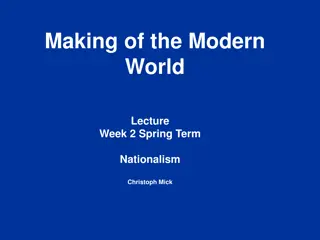A.R. Desai: Contributions to Indian Nationalism and Sociology
A.R. Desai, a prominent figure in the field of sociology, made significant contributions to Indian nationalism and the study of society in India. His works focused on topics such as the social background of Indian nationalism, peasant movements, path of development, and Marxist democratic rights. Desai applied a Marxist approach to analyze the impact of British colonialism on Indian society, particularly in relation to nationalism and capitalism. His research delved into the intricate relationship between economic conditions, social movements, and the evolution of the Indian state post-independence.
Download Presentation

Please find below an Image/Link to download the presentation.
The content on the website is provided AS IS for your information and personal use only. It may not be sold, licensed, or shared on other websites without obtaining consent from the author.If you encounter any issues during the download, it is possible that the publisher has removed the file from their server.
You are allowed to download the files provided on this website for personal or commercial use, subject to the condition that they are used lawfully. All files are the property of their respective owners.
The content on the website is provided AS IS for your information and personal use only. It may not be sold, licensed, or shared on other websites without obtaining consent from the author.
E N D
Presentation Transcript
A. R. Desai Ms. Bushra Fatima Assistant Professor Department of Sociology Shia P.G. College, Lucknow E-mail bintemujtaba1@gmail.com
A. R. Desai (1915-1994) Akshay Ramanlal was influenced by his father Ramanlal Vasantlal Desai, a well known litterateur who inspired the youth in Gujarat in the thirties. A.R. Desai took part in student movements in Baroda, Surat and Bombay. In 1947, he got married to Neera Desai, who has done pioneering work in the field of women s studies.
Major Works The Social Background of Indian Nationalism (1948) Recent Trends in Indian Nationalism (1960) The issue and problems of Rural Sociology in India (1969) Immanent Features of Indian Nationalism (1975) State and Society in India (1975) Peasant Struggle in India (1979) Rural India in Transition (1979) India s Path of Development (1984) Agrarian Struggles in India After Independence (1986)
Contributions Indian Nationalism Peasant Movements Path of Development Marxian Democratic Rights
Social Background of Indian Nationalism Desai applies the Marxist approach to the study of nationalism in India during the British rule. He spells out historical-dialectical materialism and applies it to the study of various types of movements rural and urban, caste and class structure, social mobility, education and other aspects of Indian society. According to Desai, India s nationalism is the result of the material conditions created by the British colonialism. The Britishers developed new economic relations by introducing industrialization and modernization.
Continuum He developed the Marxian framework to outline the growth of capitalism in India. He provided an analysis of the emergence of the various social forces, which radically altered the economy and society in India within the context of colonialism. The state which emerged in India after independence, he postulated, was a capitalist state.
Rise and Growth of Indian Nationalism Indian nationalism is a modern phenomenon. It came into being during the British period as a result of the action and inter-action of numerous subjective and objective forces and factors which developed within the Indian society, under the conditions of the British rule and the impact of world forces. The study of the rise and growth of Indian nationalism, is of great significance from the standpoint of a general study of nationalism. The process of the growth of Indian nationalism has been very complex and many-sided.
Continuum Pre-British Indian society had a social structure quite unique and perhaps without a parallel in history. It sharply differed in its economic base from the pre-capitalist medieval societies of European countries. This extreme social and religious division of the Hindus in particular and the Indians in general, presented a peculiar background to the growth of nationalism in India. India's peculiar social, economic and political structure and religious history, together with its territorial vastness and a teeming population, make the study of the rise and growth of Indian nationalism more difficult, but also more interesting and useful.
Continuum Another very striking thing about Indian nationalism is that it emerged under conditions of political subjection of the Indian people by the British. The advanced British nation, for its own purpose, radically changed the economic structure of the Indian society, established a centralized state, and introduced modern education, modern means of communications, and other institutions. This resulted in the growth of new social classes and the unleashing of new social forces, unique in themselves.
Continuum These social forces by their very nature came into conflict with British Imperialism and became the basis of and provided motive power for the rise and development of Indian nationalism. Thus, Indian nationalism has grown and is developing in a complex and peculiar social background. Desai traces the growth of the national movement in five phases, each phase based on particular social classes which supported and sustained it.
Factors of Indian National Movement Modern means of transport British education system Political, administrative and judicial integration Rise of new social classes New agricultural policies Industrial economic policies Religious reform movement Role of print media, newspapers and printing
Phases of Indian National Movement First Phase (1801-1885) Second Phase (1885-1905) Third Phase (1905-1918) Fourth Phase (1918-1934) Fifth Phase (1934-1939)
Reference Nagla, B.K., Indian Sociological Thought Bhartiya Samaj Shastra ke Aagrani Chintak, Orient Blackswann























